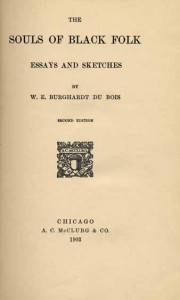 W. E. B. DuBois uses the concepts of ‘the veil’ and ‘double-consciousness’ to explain the peculiar conditions within which African Americans find themselves in the United States and the specific tools at their disposal to understand (and hopefully dismantle) those conditions. The existence of African Americans ‘behind the veil’ of segregation is hidden from the view of most white folk, but those who live behind it also move in the ‘white’ world. As such, they have knowledge about their own lives, about the functioning of the veil, and about the activities of those who live on the other side of the veil as well. The double-consciousness that ensues from being both an African-American and an American provides the basis for deeper insights into the social realm and the possibility for more effective actions against the systems of domination in place.
W. E. B. DuBois uses the concepts of ‘the veil’ and ‘double-consciousness’ to explain the peculiar conditions within which African Americans find themselves in the United States and the specific tools at their disposal to understand (and hopefully dismantle) those conditions. The existence of African Americans ‘behind the veil’ of segregation is hidden from the view of most white folk, but those who live behind it also move in the ‘white’ world. As such, they have knowledge about their own lives, about the functioning of the veil, and about the activities of those who live on the other side of the veil as well. The double-consciousness that ensues from being both an African-American and an American provides the basis for deeper insights into the social realm and the possibility for more effective actions against the systems of domination in place.
Essential Reading:
W.E.B. DuBois ‘Of Our Spiritual Strivings’ in The Souls of Black Folk
W.E.B. DuBois ‘Of the Faith of the Fathers’ in The Souls of Black Folk
Further Reading:
Gilroy, Paul ‘Cheer the Weary Traveller, W.E.B. Du Bois, Germany and the Politics of (Dis)placement’ The Black Atlantic: Modernity and Double Consciousness
Questions:
How does ‘double-consciousness’ work as an analytical category to make sense of the world?
What role does ‘experience’ have to play in understanding ‘double-consciousness’?
How can ‘double-consciousness’ help us to understand social inequality (and to do something about it)?
Can those in front of the veil understand ‘double-consciousness’? Does this matter?
Submitted by Gurminder K Bhambra
As a recent recipient of the graduate school certificate in African studies at ASU, my final drew from or focused in part on the settler narrative movement of the antebellum era. Despite the discovery of over 100 burials from this era that came to light recently, it was all treated in a quite troubing manner. Settler Colonial mentality was pervasive. It is clear, the slave labor narrative must be preserved at all cost. Local professional organizations and offices were disrespected and ignored as if the descended community did not exist. People wear the continuance of mixed relationships from this history and it is only now that they are finding their voice and their heritage in some cases. Global social theory is spot on.
I’m interested in colonialism,settler colonialism and decolonisation as it speaks to the original ownership of the land/country[?].
I was interested to read ‘the tendency among some scholars of settler colonialism to treat settlement as inevitable, simultaneously relieving settler societies and states of the burden of reconciling with indigenous peoples, and placing the burden of accommodating settler sovereignty onto those same indigenous peoples'[above]
I have been tentatively searching for references to the morality/legality of colonialisation,which could possibly have huge ramifications,and they are scarce.
Interesting. Could you please add Maria Lugones’s work in the further reading section please? She not only engaged with Quijano’s concept but revised it significantly to demonstrate the coloniality of gender. Thank you.